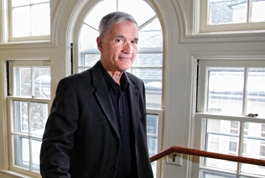David Kertzer, PhD'74, wins Pulitzer Prize for 'The Pope and Mussolini'
 April 21, 2015
April 21, 2015
By Kerri Farrell
David Kertzer, PhD’74, isn’t getting much work done, but the Brown University professor has a good reason for his lack of productivity.
Kertzer just spent another day taking phone calls and wading through nearly 500 emails from family, friends and colleagues congratulating him for winning the Pulitzer Prize in biography for his book “The Pope and Mussolini: The Secret History of Pius XI and the Rise of Fascism in Europe.” The Pulitzer winners were announced on Monday, April 20.
“The work I was supposed to do today seems to have gone out the window, but it’s great,” Kertzer, the Paul R. Dupee Jr. University Professor of Social Science and professor of anthropology and Italian studies, said on Tuesday. “This is a happy time.”
This is the second consecutive year a Brandeis alumnus has won a Pulitzer. Historian Alan Taylor, PhD’86, won his second Pulitzer in history last year, capturing honors for “The Internal Enemy: Slavery and War in Virginia, 1772-1832.” Other alumni to earn the honor include journalists Thomas Friedman ’75 and Margo Jefferson ’68, and scholar David Oshinsky, PhD’71.
“We are excited that another alumnus from the Brandeis Graduate School of Arts and Sciences (GSAS) has received a Pulitzer Prize,” says Eric Chasalow, GSAS dean and the Irving Fine Professor of Music. “This is testament to the quality of both our students and our faculty.”
Kertzer credits Alex Weingrod, his Brandeis mentor and former chair of the anthropology department, for steering him toward the study of Italy back in 1969. “At the time I entered my doctoral program at Brandeis, I was interested in working on politics and religion within an urban environment,” Kertzer remembers. “Alex had done research in Italy and Sardinia, and suggested I look into the Italian situation, because at the time it had one of the largest Communist parties in a non-Communist country, and, of course, the Vatican. From a politics and religion point of view, it was an interesting case. It was my experience at Brandeis that set me on the path to Italy.”
Kertzer’s dual biography of two of the 20th century’s most iconic and influential figures explores the ways in which Pope Pius XI and Benito Mussolini relied on and used each other to preserve and protect their respective institutions, the Catholic Church and Italy’s fascist government.
As a young doctoral student in Anthropology doing research in Italy, Kertzer wrote “The Popes Against the Jews: The Vatican’s Role in the Rise of Modern Anti-Semitism.” He was limited to speculating about Pope Pius XI’s relationship with Mussolini because of the lack of available archival material from the Vatican. Then, in 2002, Pope John Paul II announced that Pius XI’s papers would be released to the public.
Kertzer dug right into the wealth of new material. “Pius XI’s time in power, from 1922 to 1939, was a dramatic period and such a controversial one among historians that it was very tempting to be among the first people in those archives,” Kertzer says. “I felt a responsibility to see whether what I thought was the case about this relationship was actually the truth, and do full justice to the story.”
Identifying and digitizing more than 25,000 pages, Kertzer reconstructed the complex dynamic between two competing leaders. “The Pope and Mussolini” reveals how the men reached mutually beneficial accords, spied on each other and, later, engaged in conflict when Mussolini began to follow more closely in Hitler’s footsteps.
Although the book illuminates religious and political machinations in pre-Holocaust Italy, Kertzer sees important links to the present as well. “The typical statement everyone hears, particularly about some Muslim countries today, is that they are ‘stuck in the Middle Ages,’” he says. “But this book describes a period when the Catholic Church did not believe in the separation of church and state, in freedom of religion, or speech, or association. In those ways, there was kind of a natural partnership with a fascist regime. To realize that this was the case in the heart of Europe not all that long ago puts things in a very different perspective.”
Kertzer, who is currently on sabbatical, is working on a book about the Roman Revolution of 1848 and the restoration of the pope to power by the French army in 1849.
Additionally, filmmaker Steven Spielberg plans to turn Kertzer’s 1997 work, “The Kidnapping of Edgardo Mortara,” into a film. Another Pulitzer winner, Tony Kushner, is working on the screenplay.
Read an excerpt from "The Pope and Mussolini" in the Brandeis Magazine.






